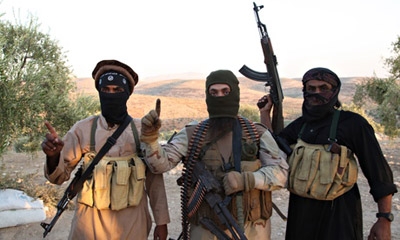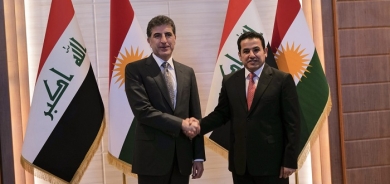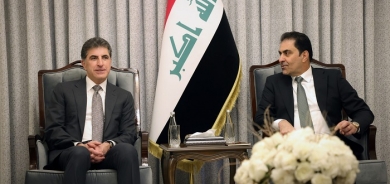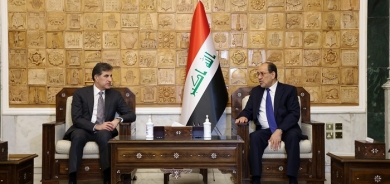How to solve the Syrian crisis
November 13, 2014
From Media

There is no real consensus on how to resolve the Syrian conflict, but there is one regarding the urgent need to. It has become an imperative to stop the fanatical jihadis in their tracks before they become an unstoppable global menace. The divergence of opinions on how to best go about this unfortunately has less to do with pragmatism or the political and military realities of the conflict, and instead reflects the specific interests of those who hold them. While the world argues and procrastinates, a terrifying threat is slowly emerging from the chaos of Syria’s civil war: transnational jihadist terrorism. The premise is very simple. In order to end that threat, a workable resolution to its cause must be found.
What we are seeing now is the US – the most effective actor and power broker in the Middle East – pursuing a limited containment strategy against the most noxious of the jihadist groups – Islamic State – in both Iraq and Syria. Its strategy in the former seems far more coherent than in the latter, relying as it does on the presence of trusted allies on the ground, namely the Iraqi army it built and the Kurds to whom it granted self-rule to as Iraq fell apart following the 2003 invasion. The Syrian strategy is far more ambiguous and lacks clear vision.
In addition to almost daily sorties against Isis, the US has now expanded the military campaign of its largely token coalition in Syria to target other jihadist factions like Jabhat al-Nusra and Ahrar al-Sham – the very same groups considered indispensable allies by the local “moderate rebels” that the coalition had until recently been backing against Assad’s forces, but now seems to have given up on entirely. A new strategy that seems to have very little chance at success is being hastily formulated. The aim is to build a proxy rebel army from scratch to take on the jihadis, recruiting from the sprawling refugee camps that house millions of displaced Syrians in neighbouring countries. It is unclear how the US will go about convincing Syrians brutalised and displaced by their regime to turn their attention away from battling it to focus instead on fighting groups that they consider brothers in arms.
The Americans either have to employ some extraordinary powers of persuasion, or otherwise end up with little more than a limited and mediocre mercenary force motivated by money and lacking any real conviction. A force like that would stand little chance against the more numerous and better motivated fanatical jihadis, let alone a cornered regime viciously fighting tooth and nail for its very survival.
The regional allies of the US have meanwhile been pumping hundreds of millions of dollars of weapons and money into some very dubious Syrian rebel groups for the past three-and-a-half years – a lot of which, we are now learning, has ended up in the hands of the very extremists that now pose such a threat to regional stability and global security.
This might have finally convinced them to cut off funding and cease the covert facilitation that allowed thousands of foreign fighters, including well-known battle-hardened jihadis, to stream into Syria via Turkey by the bus load. It has not yet convinced them, however, to earnestly push for a comprehensive end to a conflict now seriously spinning out of control.
Instead, they seem stuck on the path they have obstinately pursued since the Syrian conflict first escalated from a popular uprising into a civil war. Which is to call for the toppling of the regime, and go about that by supporting, arming and trying to unite a plethora of groups with fundamentally conflicting ideologies and aims – including hardline militant Islamists – with little thought for the consequences this ill thought out strategy would have in the future.
The US and many of its European allies merrily went along with this vague notion of regime change, failing to grasp the full implications of their commitment to toppling an entrenched and pervasive regime with a powerful army and the unflinching support of its allies.
For their part, the main backers of the Assad regime – Iran and Russia – believe it can ultimately triumph militarily, and eventually regain control of much of the territory it lost during three years of insurgency; in essence turning back the clock to pre-conflict times when it had absolute power. They too are motivated by their own narrow interests and not what is best for Syria or its people. In Iran’s case it is the sectarian-inspired struggle for influence over the Middle East with arch rivals the Saudi-lead Gulf. Russia, meanwhile, is motivated by its own strategy to counter what it views as Nato expansion into its former spheres of influence.
This “eventual winner” view is fundamentally flawed, however, as the fabric of the complex multi-ethnic and multi-confessional Syrian society has now been profoundly and irreversibly torn apart by the civil war. Any attempt to patch it back together again without fundamentally changing the repression, corruption and brutality that led to the explosion of popular anger in 2011 is doomed to fail. It may bring some sort of precarious stability in the short term, but this will likely not hold in the long run. The regime is unlikely to self-regulate and reform. Worse still, an outright regime victory might see it carry out campaigns of mass violence targeted at populations it regards as having supported the rebellion.
But this view has been bolstered by shifting global perceptions towards the Syrian conflict, from being a popular rebellion against tyranny to a secular state under siege from the forces of extremism. Confusingly, both statements are currently equally valid. This has certainly played to the regime’s hand and boosted perceptions of the likelihood of its survival, at least in the short term. Ever opportunistic, it is using the US-led coalition’s strikes against the jihadis to its advantage, pushing on with existing campaigns to recapture strategic territory it lost long ago.
What we are left with is a rather grim assessment of the current situation in Syria, whereby an outright victory by either side is neither a real possibility nor a desirable one, while the jihadis – if left unchallenged – will grow to frightening proportions. Leaving the regime, at least in its current form, in power for the long term is also an unacceptable outcome for many, as is the proposed break up of Syria into sectarian cantons.
What is required to properly resolve the Syrian conflict is for the major powers backing both regime and opposition camps to fundamentally change their long-held, self-interested policies and engage in meaningful talks that will see real concessions and compromises made. The outcome would ideally be some form of transitional power-sharing between those elements of the regime and opposition acceptable to the majority of Syrians and capable of effectively addressing their grievances. This transitional authority would then be in a unique position to take on and eventually defeat extremism in Syria, with the help and support of the wider international community.
The time has come for the world to get serious about resolving this conflict: if not for the sake of the hapless Syrian people, then at least for the sake of global security and stability. In the meantime, pragmatism dictates that they should be strongly pushing for a de-escalation and freezing of the conflict, creating conditions in which localised ceasefires can hold, and an environment both conducive to this peace process and hostile to those against it.
At the very least, if those peace talks fail it would then be possible to cement a less desirable but equally viable scenario for the long term. A solution akin to the one that ended the long-running civil war in neighbouring Lebanon: a shotgun wedding and delicate balancing of diverging sectarian and political interests, in addition to possible self-rule but with no territorial break up.











